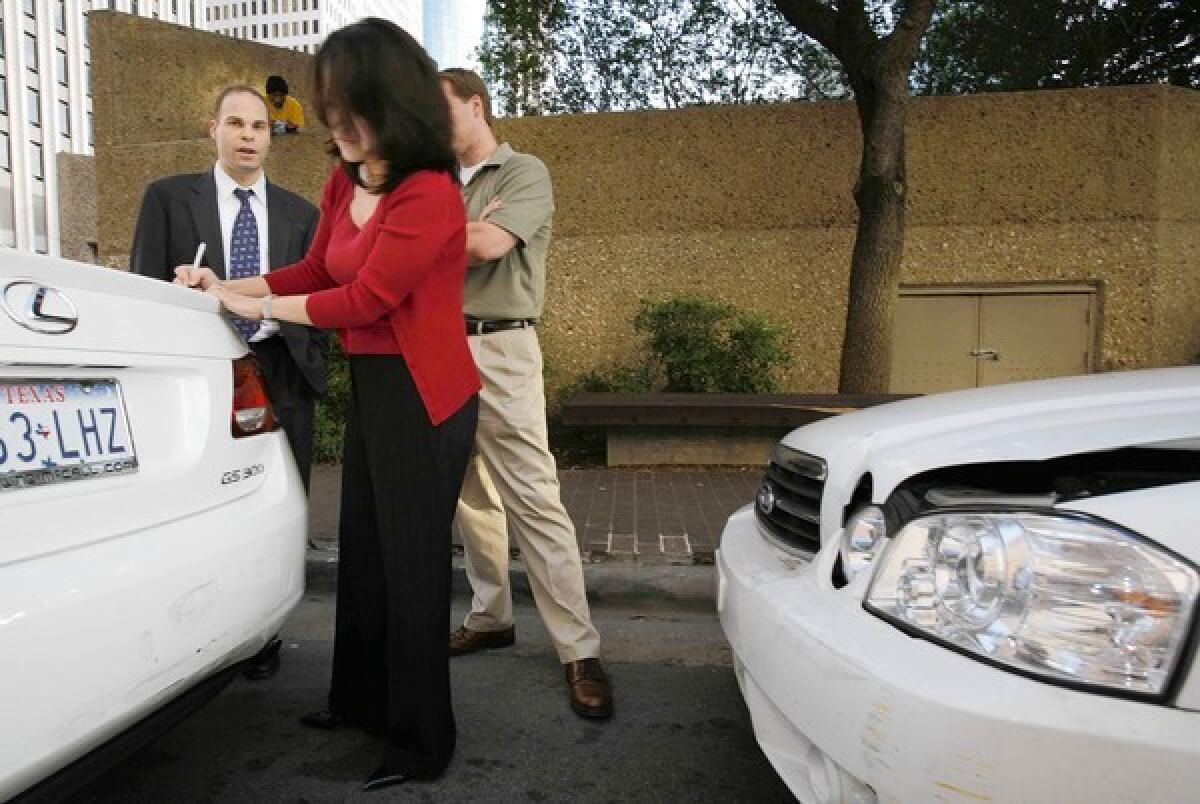Know your rental car insurance coverage

- Share via
As the owner of a communications agency in Del Mar, Calif., Andy Abramson travels often. In fact, he’s had two accidents in the last two years while he was driving rental cars.
In the first case, a car collided with Abramson’s rental. His insurance company’s liability coverage paid for the other car’s damage. In the second case, a car ran a red light and hit his rental car. That time, he had an American Express Premium Car Rental Protection plan and had bought the rental company’s liability insurance. American Express “covered an extra $500 that the rental company was trying to stick me with and completely took the matter out of my hands,” Abramson said.
The AmEx policy cost Abramson $24.99 for each rental period ($17.95 for California residents).
None of the damage was the responsibility of his insurance company. For him, it was a good deal. But is this the way everyone needs to go when renting a car on vacation? What should you do to protect yourself when you rent a car for an occasional trip?
Although many credit card companies offer collision and theft protection insurance if their card was used as payment, auto rental coverage varies from company to company — hence the importance of contacting your credit card company before renting a vehicle.
Credit card insurance usually includes payment for the damaged or stolen rented car, and some may provide for other costs, such as towing or rental agency fees.
“Know before you go,” said Mark Sheehan, an Australian writer of travel guides for professional tour guides and author of the book “America Over Easy — The Know Before You Go Guide.”
“You need to confirm that your auto insurance is up to speed and understand which travel and car rental coverage benefits are and are not offered by your credit card company,” he said. “Car rental folks will try to sell you insurance because they make fat commissions. They can scare you into a purchase even if you don’t need it.”
How do you know whether your insurance covers a rented car?
Automobile insurance policies typically give you the same car rental coverage as you have on your own vehicle but with a few limitations, such as leaving the country and loss of use, said Jimmy Spears, spokesman for USAA automobile insurance.
Of course, the car rental company will offer insurance as part of the rental contract, but it will cost you — as much as $25 a day, said Philip Reed, senior consumer advice editor for Edmunds.com.
If your rental car is damaged by an “act of God,” such as a hurricane, an earthquake or a tornado, the loss may not be covered, depending on your policy, said Chris Kissell, spokesman for Insurance.com, an insurance comparison website.
That’s what happened to Valerie McCarty. In April, she was traveling in North Carolina in a rented car with her mother and two young daughters when a tornado struck.
“The winds kicked up so suddenly,” McCarty said. “I was forced to the side of the road; there was no visibility. Then something smashed into my driver’s side window and shattered it, and something else hit and actually broke it.... It was the most surreal and scary experience of my life. Luckily, we got out of it safely.”
McCarty reported the incident to the car rental agency, which arranged for another car to be delivered to her. She then contacted her insurance agent, who advised her to contact her credit card company.
“I have been told to wait to hear what happens next as they all contact each other to figure out who pays for what,” she said.
McCarty is still on the hook two months later. So far, the rental car company, her insurance company and her credit card company have not provided a formal update. “My guess is that with all the natural disasters this spring, my case is way down on the totem pole,” she said. “I’m optimistic that all the parties will do what they said they will, but there is no doubt it’s a bit of the ‘hurry up and wait’ game. I had to report everything swiftly, but the final decisions can lag.”
Here are some things to keep in mind if you get into an accident while on vacation:
• If you have an accident in a rental car, your own insurance will usually cover the damages (though not always). If you don’t have insurance on your own car — or if your own policy lacks certain types of coverage (e.g., comprehensive and collision) — you could end up paying a bundle after an accident.
• Credit cards often provide some rental coverage, but they may not be as comprehensive as you think. You need to call your credit card company before renting a car to find out what your specific card provides. You should also contact your own auto insurance company to ascertain the coverage for a car rental on your policy and supplement that, if need be, with what is offered by the credit card company.
• If you buy insurance from the rental car company, remember that in most cases the coverage extends only to the people listed as drivers on the rental car contract. If you don’t add your brother to the contract and he is driving during a crash, you probably will not be covered.
• Be sure to check the rental vehicle for damage before leaving the lot. Carefully read the rental agreement to be sure you are declining the insurance offered (if that’s the case) and to become familiar with the terms of the agreement.
• Don’t forget the registration if you get stopped or you’re in an accident. Ask the rental company where the car registration is. It’s usually in the glove box. If not, your rental contract will serve as your temporary registration. Always keep a copy of the signed rental contract in the car with you.
More to Read
Sign up for The Wild
We’ll help you find the best places to hike, bike and run, as well as the perfect silent spots for meditation and yoga.
You may occasionally receive promotional content from the Los Angeles Times.






